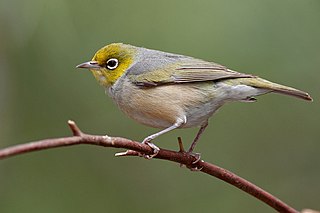
The silvereye or wax-eye, also known by its Māori name tauhou, is a very small omnivorous passerine bird of the south-west Pacific. In Australia and New Zealand its common name is sometimes white-eye, but this name is more commonly used to refer to all members of the genus Zosterops, or the entire family Zosteropidae.
The history of Tasmania begins at the end of the Last Glacial Period when it is believed that the island was joined to the Australian mainland. Little is known of the human history of the island until the British colonisation of Tasmania in the 19th century.

The Bank of New South Wales (BNSW), also known commonly as The Wales, was the first bank in Australia, being established in Sydney in 1817 and situated on Broadway. During the 19th century, the bank opened branches throughout Australia and New Zealand, expanding into Oceania in the 20th century. It merged with many other financial institutions, finally merging with the Commercial Bank of Australia in 1982 and being renamed to the Westpac Banking Corporation on 4 May that year under the Bank of New South Wales Act 1982.
Banking in Australia is dominated by four major banks: Commonwealth Bank, Westpac, Australia & New Zealand Banking Group and National Australia Bank. There are several smaller banks with a presence throughout the country which includes Bendigo and Adelaide Bank, Suncorp Bank, and a large number of other financial institutions, such as credit unions, building societies and mutual banks, which provide limited banking-type services and are described as authorised deposit-taking institutions (ADIs). Many large foreign banks have a presence, but few have a retail banking presence. The central bank is the Reserve Bank of Australia (RBA). The Australian government’s Financial Claims Scheme guarantees deposits up to $250,000 per account-holder per ADI in the event of the ADI failing.
MyState Limited is an Australian financial group, headquartered in Hobart, Tasmania. It formed in 2009 following the merger of the Tasmanian Perpetual Trustees and MyState Financial. In 2011 it further purchased the Queensland-based Rock Building Society for $68.3 million AUD. In October 2014, its largest section, MyState Financial received authorisation from the Australian Prudential Regulation Authority to rename itself to MyState Bank.

George Washington Walker was an English-born Australian missionary for the church called Religious Society of Friends, or Quakers.
The 1893 banking crisis in the Australian colonies involved the collapse of a considerable number of commercial banks and building societies, and a general economic depression. It occurred at the same time as the US Panic of 1893 (1893–1897).
Rosny Park is a suburb of Hobart, Tasmania, located in the City of Clarence on the eastern shore of the Derwent River. It is about five kilometres from the city centre of Hobart. Rosny Park is the commercial twin of its residential namesake, Rosny.

The Bank of Australasia was an Australian bank in operation from 1835 to 1951.

Campbell Town is a town in Tasmania, Australia, on the Midland Highway. At the 2021 census, the town had a population of 823.
Vincent Wanostrocht Giblin, was an Australian banker and cricket player, who played one game for Tasmania. He has the distinction of having participated in the first ever first-class match in Australia, and opened the batting in the second innings.

Swan Island, part of the Waterhouse Island Group, is a 239-hectare (590-acre) granite island situated in Banks Strait, part of Bass Strait, lying close to the north-eastern coast of Tasmania, Australia.

Westpac Banking Corporation, known simply as Westpac, is an Australian multinational banking and financial services company headquartered at Westpac Place in Sydney.

Pittosporum multiflorum, known as the orange thorn, is a shrub growing in eastern Australia. The dense foliage provides a habitat for small birds and animals. It grows on shales or volcanic soils, from Eden, New South Wales north to Queensland, usually in or near rainforest areas.
Robbins Island is a 9,900-hectare (24,000-acre) island located in Bass Strait, lying off the northwest coast of Tasmania, Australia. The island, separated from the Tasmanian mainland by a highly tidal area known as Robbins Passage, lies south to the adjacent Walker Island.

The English, Scottish & Australian Bank Limited was an Australian bank founded in 1852 by royal charter in London and named English, Scottish and Australian Chartered Bank. Following a financial reconstruction in 1893 its business was renamed English, Scottish and Australian Bank Limited.

NAB House is an A-grade office building situated in Hobart, Tasmania.

The Iron Pot Lighthouse is a lighthouse located on Iron Pot island in Storm Bay, at the mouth of the Derwent River in Hobart, Tasmania, Australia. Constructed in 1832 with convict labor, Iron Pot Lighthouse is the oldest lighthouse in Tasmania and oldest original tower in Australia. It was the first lighthouse in Australia to utilise locally manufactured optics, and became the first Australian lighthouse to use solar power in 1977. The 11-metre (36 ft) tall tower has a range of 11 nautical miles.

The National Bank of Australasia was a bank based in Melbourne. It was established in 1857, and in 1982 merged with the Commercial Banking Company of Sydney to form National Australia Bank.

Murray Street is one of four north-west roads within the Hobart City Centre (CBD). The street is named for Captain John Murray, commandant at Hobart Town, by Lachlan Macquarie. One of Hobart's original seven streets, Murray Street was formalised by surveyor James Meehan (1774-1826) on 25 November 1811.













